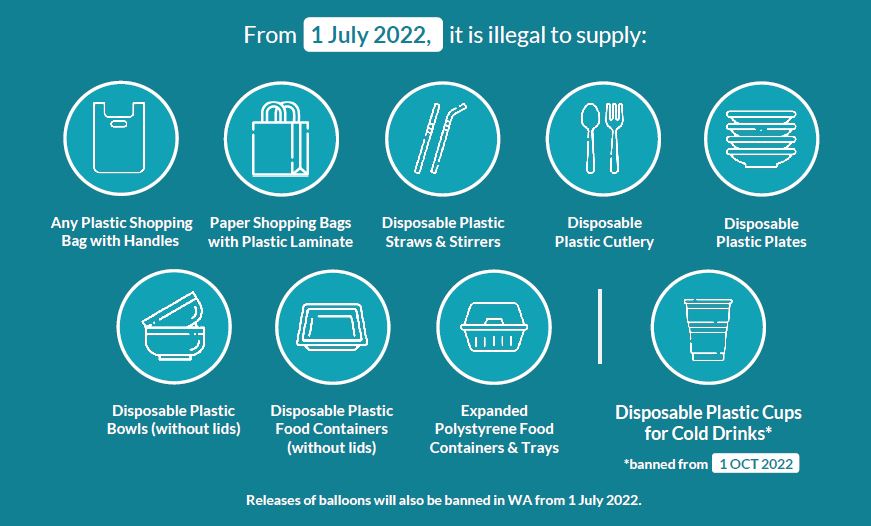Ecological Sustainable Building Design
The Shire adopted a Sustainability Strategy (2021-31) in March 2021 to guide our whole of organisation approach to improving the sustainability of the Shire’s operations and supporting our community to do similar. This Strategy provides 10 key pillars and outlines objectives for how we intend to implement improvements. The Shire's Local Planning Strategy will be a key contributor towards these achievements in providing a framework for how Denmark develops into the future
Land use planning can achieve sustainability through directing the placement of land uses in a manner that reduces transport, promotes community interaction and avoids environmental harm. The planning framework also supports sustainability through guiding development in a manner that is more ecologically sustainable.
Ecologically Sustainable Development (ESD) is defined as: “Development that improves the total quality of life, both now and in the future, in a way that maintains the ecological processes on which life depends”. (National Strategy for Ecological Sustainable Development).
The WA government also committed in 2019 to achieving net zero greenhouse gas emissions by 2050. In addition, the Planning Institute of Australia (PIA) in 2020 declared a “Climate Emergency” and in 2021 have adopted the World Green Building Council (WGBC) commitment towards zero net carbon before 2050.
In Western Australia, the construction and operation of buildings produces about 25 per cent of the State’s carbon emissions. To achieve the objectives of the Western Australian Climate Policy and State net zero emissions target, and avoid catastrophic global warming, emissions from the construction and operation of buildings will need to be significantly reduced (Department of Water and Environmental Regulation 2020).
There are many ways to improve the energy efficiency of buildings, reduce emissions and provide operating cost savings to occupants; however, a range of challenges often prevent these outcomes from occurring, such as up-front construction and renovation costs, the availability of energy efficiency information on individual properties at point of sale or lease, and inadequate planning and building provisions.
Increasing the ESD related minimum development standards contained within the Shires Planning Framework has the potential to take pressure off the public energy network and make a substantial contribution to reducing the State’s greenhouse gas emissions and achieving its net zero emissions target.
For further information about Ecologically Sustainable Development in building design please find attached an information sheet on Sustainable Homes.

Plastic Free July
As a global movement, Plastic Free July helps millions of people be part of the solution to plastic pollution so we can have cleaner streets, oceans, and beautiful communities. Choosing to reuse, refuse single-use plastic, and close the loop on waste are all ways we can be responsible for our own impact.
Positive action to refuse, reduce, reuse, and recycle is in line with the Shire's recently endorsed Sustainability Strategy and associated Action Plan key principles of Sustainable Materials & Products, and Zero Waste.
The WA state government in June 2021 announced it will be fast-tracking its single-use plastics bans by four years. The state's Plan for Plastics will be delivered by the end of 2022 instead of 2026 as originally planned. "We're very determined to phase out as much plastic as we possibly can," WA Premier Mark McGowan said. Plastic plates, bowls, cups, cutlery and takeaway polystyrene food containers will be banned in the state by the end of this year. Bans on plastic-lined coffee cups and lids, produce bags and microbeads have also been brought forward to the end of 2022. "If it can't be reused or recycled it shouldn't be made, and that's what we want to move to in Western Australia," WA Environment Minister Amber-Jade Sanderson said.
Plastic Free Reduction, a local Denmark community action group, has taken positive action to reduce plastic use in our town. Watch the video The Power of Passion here: https://m.youtube.com/watch?v=a_N9E1TCmMI Or visit their website on: https://www.facebook.com/plasticfreedenmark
Please find attached tips on how you as an individual can personally make a difference.
And if you think you are too small to make a difference – you have never spent the night with a mosquito!


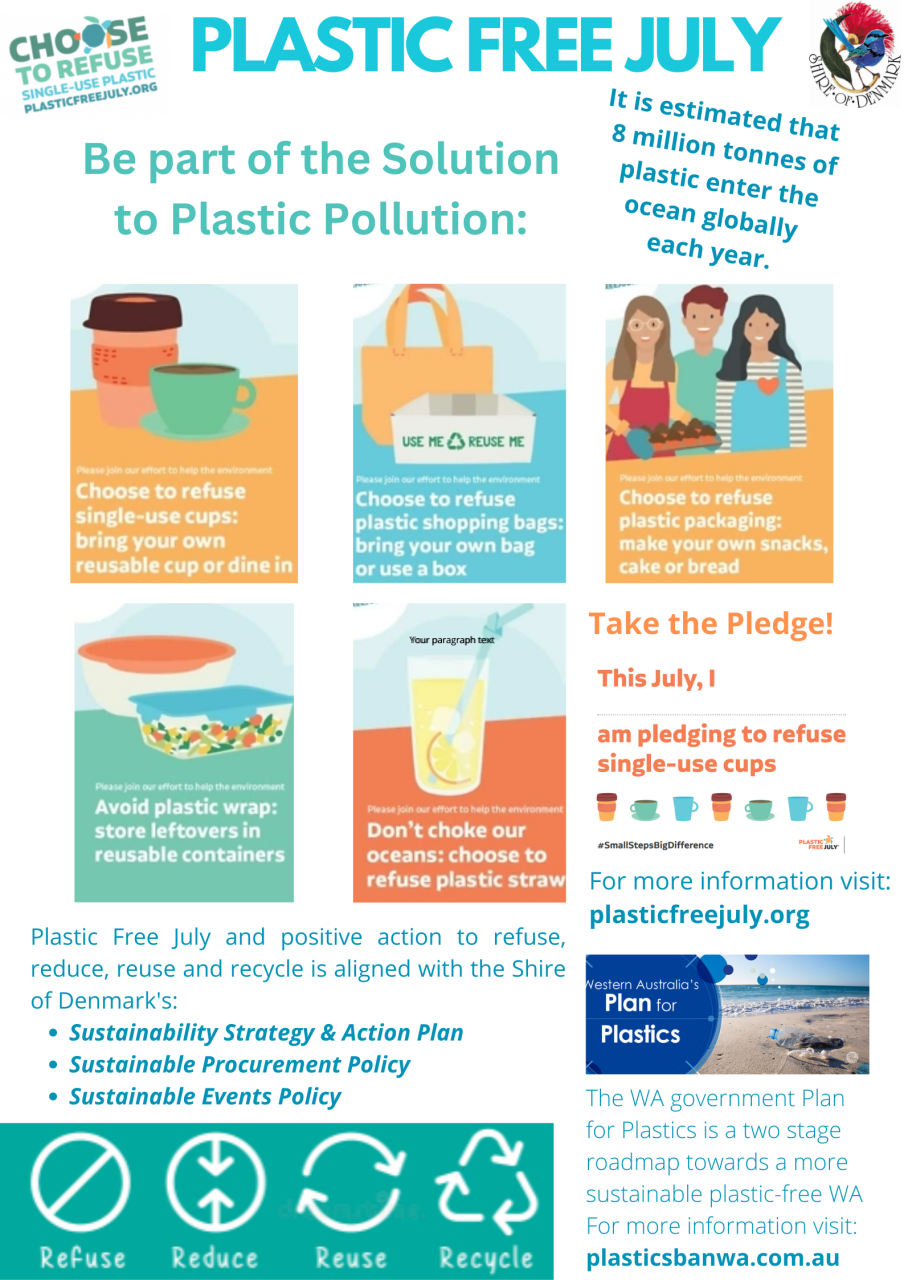
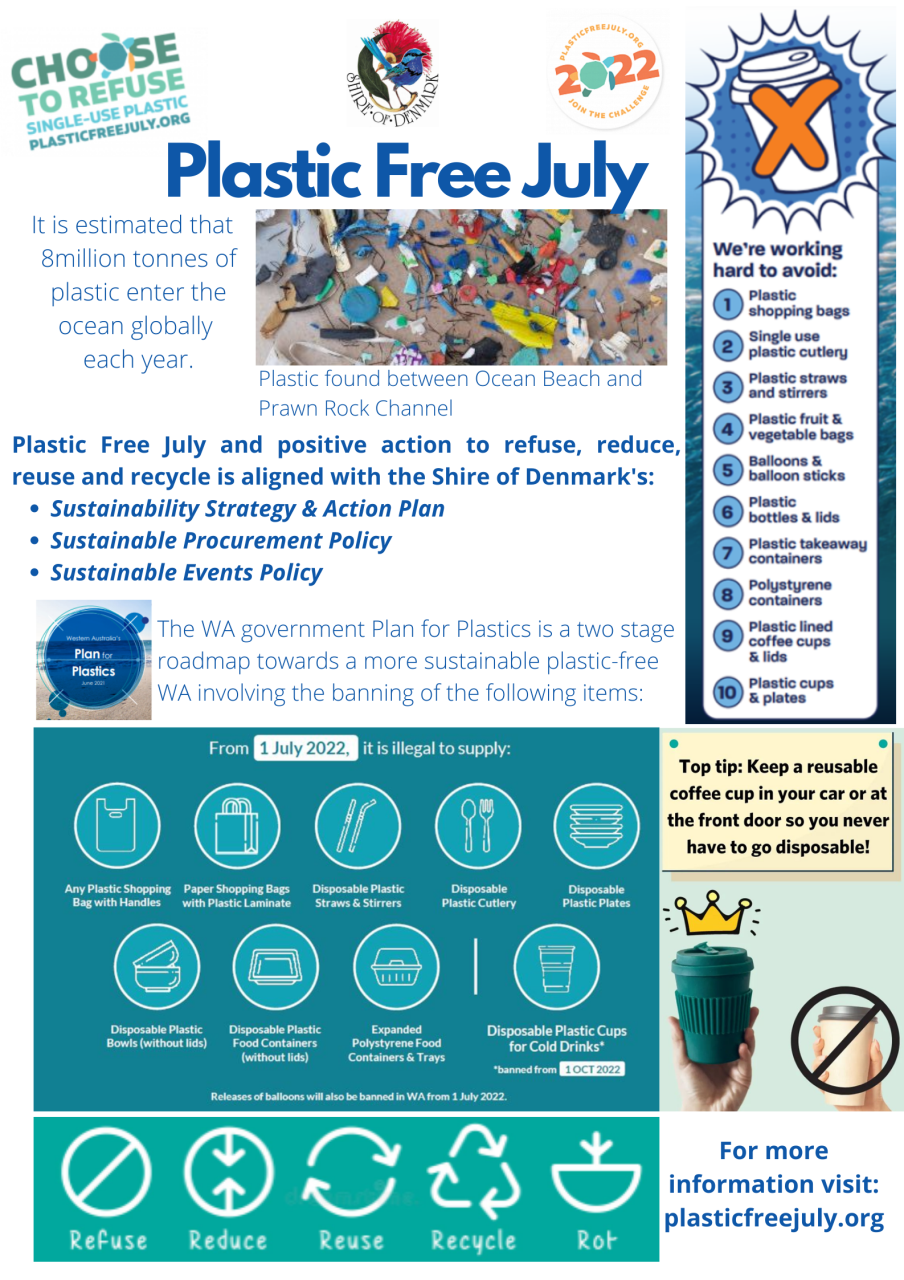
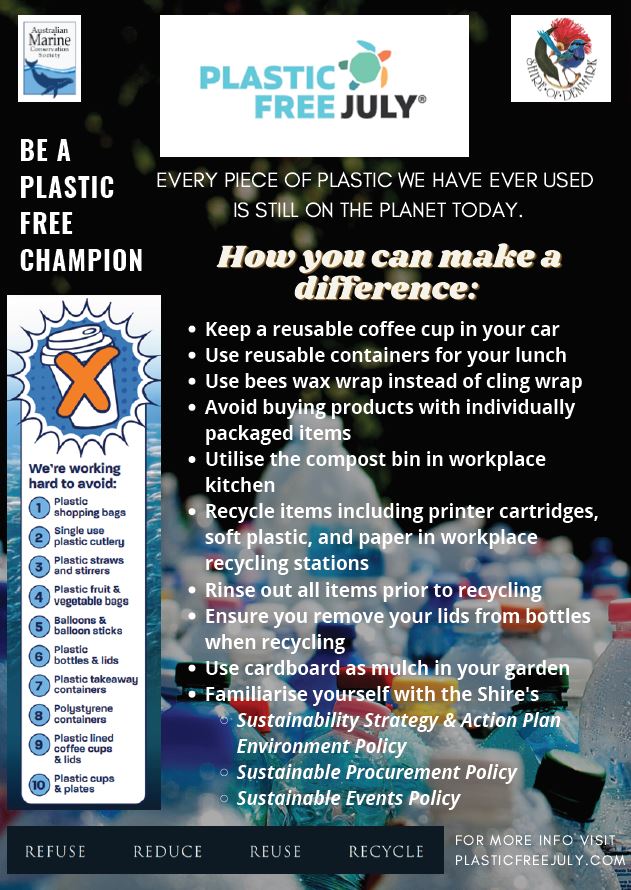
Plastic Reduction - Sustainable Events Bunting
Thanks to Plastic Reduction Denmark (PRD) and local school students, our township is decked in environmentally-friendly bunting to replace the deteriorating tinsel that usually adorns Strickland Street over the festive season. Spirit of Play, Denmark Primary School, Golden Hill Steiner School and Denmark Senior High School were invited by Karen Andersson to take part in the project, with the schools enthusiastically incorporating bunting making into their art classes. Students were encouraged to unleash their creativity, decorating the flags however they liked and making themed bunting for different events held throughout the year.
Members of PRD helped to sew the flags together which totalled 67 metres, the project prompting conversation about plastic pollution and plastic alternatives. Ms Andersson said that the project opened up learning opportunities for teachers and students about plastic reduction and gave students a sense of achievement, pride and connection. “Students can see their work and that of their peers displayed in the centre of town and it becomes a fun activity to spot where theirs is hanging,” she said. Businesses were also given Christmas bunting to hang outside their shops which they can keep and can return to PRD for repair as they age.
Shire of Denmark Chief Executive Officer David Schober said the work Plastic Reduction Denmark is doing in the community should be celebrated. “When Karen first got in touch to see if the Shire would reduce the amount of tinsel used for public Christmas decorations by opting for community-made, plastic-free bunting – it was a no brainer,” Mr Schober said. “The volunteers behind Plastic Reduction Denmark are leading a fantastic community project and I look forward to seeing how this colourful and creative project grows into the future.” Mr Schober was also pleased to say that the Shire has committed to halt the purchase of replacement tinsel and other plastic Christmas decorations going forward. “We can’t wait to see more and more festive bunting decorating our town in the years ahead.”
Media Release Published Thursday 16th December 2021.

Photo: Plastic Reduction Denmark with Environmentally Friendly Festive Bunting
The production and use of environmentally-friendly sustainable bunting by local community organisation Plastic Reduction Denmark is aligned with the Shire of Denmark Sustainable Events Policy P100516 and the Shire of Denmark Sustainability Strategy (2021-2031) Key Principle 8: Sustainable Materials & Products aim to have a limited negative impact on people and natural resources and do not deplete or degrade the environment and Objective 8.4 Encourage the community to embrace the notion of re-use materials rather than purchase of new materials.
Get in touch with Plastic Reduction Denmark - https://bit.ly/3IQP6Hy
WA Ban on Lightweight Plastic Bags
From 1 July 2018, it will be prohibited for retailers in WA to supply lightweight plastic bags with handles, 35 microns thick or less, including degradable, biodegradable and compostable plastic bags. There are loads of options available to shoppers to replace plastic bags, including cardboard boxes, reusable bags (eg. hessian, cotton) and baskets.
All the details on the bag ban, including a full list of plastic bag alternatives, can be found on the Department of Water and Environmental Regulation’s website www.whatsyourbagplan.wa.gov.au
Support for retailers can be found on the National Retail Association’s website at www.bagbanwa.com.au
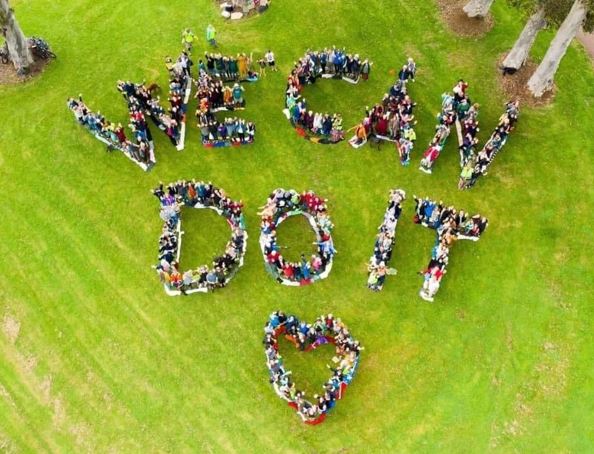
WA Plan for Plastics
WA single use plastics phase-out plan began in mid-2022.
- WA Plastics Ban Stage 1 commenced 1st July 2022
- ITEMS INCLUDE: All plastic shopping bags (with handles) of any thickness, including paper bags with plastic laminate. The ban also applies to disposable plastic straws, stirrers, cutlery, plates, unlidded bowls and unlidded food containers. A ban on cups for cold drinks will commence in October 2022.
- ENFORCEMENT: Businesses cannot continue to supply banned items and must transition to compliant alternatives as soon as possible.
- However, the WA Government recognises some businesses may be experiencing supply chain issues and may need further support over coming weeks. The Government has emphasized they will pursue an education-first and common-sense approach to enforcement. Some of the items being banned are the first banned in Australia and, as expected, some businesses will need to trial different solutions with varying success.
- Businesses can apply to the Government for a time-limited exemption (see forms here). Compliance action will be suspended while a reasonable application is being assessed.
- BUSINESS ENGAGEMENT PROGRAM: The National Retail Association (NRA) has spent the first half of 2022 engaging with over 10,000 retailers, visiting 330 centres and precincts (over 4200 stores), engaged over 200 suppliers, held over 20 online sessions & responded to over 450 calls and emails. The NRA’s WA hotline and website will remain live for at least another 12 months.
- The NRA has developed a Government-funded campaign which is being displayed in 100 shopping centres across WA from today. The “Positive Change is…” campaign designed to supplement existing business education about the ban, while reminding customers that businesses will need time, support and understanding while they transition to comply.
- FOR MORE INFORMATION please visit: www.plasticsbanwa.com.au
Please click here for the latest information on WA Plan for Plastics.https://www.wa.gov.au/service/environment/business-and-community-assistance/western-australias-plan-plastics
